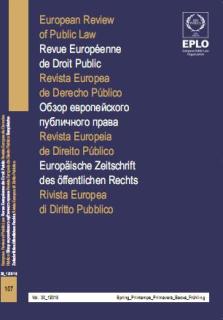
Freedom of Expression in the Internet
The Example of the “Right to Be Forgotten”
Professor of Public Law, National and Kapodistrian University of Athens,
Member of the Greek Data Protection Authority
The “right to be forgotten” has recently become very important, because we realized that the Internet ‘never forgets’. One of its main forerunners is the Lebach decision (1973) of the German Federal Constitutional Court and the cornerstone of this right is the decision of the Court of Justice of the European Union in the case of Google Spain (2014). Thus the right to be forgotten was initially created by the judiciary, when the legislator adopted the right through the Regulation for the Protection of the Personal Data (2016). However, there is a remaining problem shown in the balance between the fundamental rights of expression and information and the right to be forgotten. Under specific circumstances the existing public interest can override the right to be forgotten. Despite these problems, the right to be forgotten is part of our everyday life and can be considered as a social and legal progress.
Le “droit à l’oubli” est devenu récemment très important, parce que nous avons réalisé qu’Internet “n’oublie jamais”. L’un de ses principaux précurseurs est l’arrêt Lebach (1973) de la Cour constitutionnelle fédérale allemande, et la pierre angulaire de ce droit est l’arrêt rendu par la Cour de justice de l’Union européenne dans l’affaire Google Spain (2014). Ainsi le droit à l’oubli a-t-il initialement été créé par le judiciaire, alors que le législateur a adopté le droit à travers le règlement de 2016 sur la protection des données personnelles. Cependant, il subsiste un problème, dans l’équilibre entre les droits fondamentaux d’expression et d’information et le droit à l’oubli. Dans certaines circonstances spécifiques, un intérêt public peut primer le droit à l’oubli. Malgré ces problèmes, le droit à l’oubli fait partie de notre vie quotidienne et peut être considéré comme un progrès social et juridique.





















